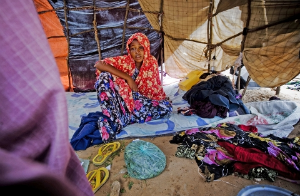
The global development charity issued a statement as delegates from global governments met in New York for the annual
Commission on the Status of Women (CSW), which addresses women’s universal rights and gender equality (10-21 March).
The talks will focus on progress towards the Millennium Development Goals (MDGs) and the new planned Sustainable Development Goals (SDG) that will follow on from 2015, which could offer significant opportunities to deepen global commitment to gender equality.
In its new briefing paper,
Gender Justice: From MDGs to SDGs, Christian Aid highlights the need for a specific goal to address the rights of women and girls in the new post-2015 framework.
Helen Dennis, Christian Aid's Senior Advisor on Poverty and Inequality said that while progress has been made in areas such as girls’ education, other areas such as tackling violence against women and girls remains under-resourced.
'The new targets should seek to secure economic freedom for women, as well as recognising the increasing impact of climate change and disasters on women and girls.’
The report suggests faith communities have a key role to play in meeting the MDGs, and any new post-2015 targets, by tackling the damaging social and cultural norms that can perpetuate gender inequality.
Drawing on the work of Christian Aid's Brazilian partner SAAD, Ms Dennis said, ‘While we recognise that faith can sometimes play a part in reproducing and reinforcing damaging norms, we also want to recognise that many faith-based organisations are doing fantastic work challenging stereotypes and promoting gender equality. Indeed, the post-2015 agenda will only be a success if the churches and other faith-based actors are acknowledged as key participants.
'We believe poverty is not solely about a lack of income, but rather about powerlessness. Therefore poverty cannot be eradicated in a world where gender discrimination prevents women and girls from exercising power over their own lives and bodies, within their household and their community.
‘We welcome the call from a number of governments, including the UK, for a separate gender equality goal within the post-2015 plan and hope more governments will come on board and ensure that neglected areas, such as violence against women and girls, are visible in the new set of goals and targets. Getting them right is absolutely essential if we want to stamp out inequality and eradicate poverty.’